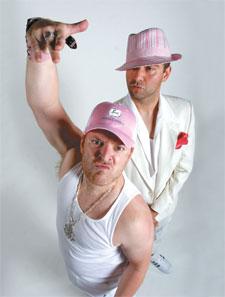Fags and rap music have long enjoyed a passionate and storied love affair. Granted, when I say love affair I actually mean the sort of bloodied, violent mess that frequently occurs between gay men and the homophobes who secretly want to fuck them. Chris Craddock and Nathan Cuckow challenged that status quo in the 2007 Fringe Festival with their smash hit Bash’d, a story of the love that dare not speak — or rap — its name.
The play was a big, boisterous hit. Craddock and Cuckow‘s energetic turns as rappers T-Bag and Feminem were masterful as they narrated the story of Jack and Dillon, two lovers from different worlds whose love affair is interrupted when one of them is gaybashed. The boys took their show on the road to festivals in BC, Dublin and New York, culminating in a successful Off-Broadway run.
Flush with awards and raves, Craddock and Cuckow bring Bash’d back to Toronto, this time as part of Theatre Passe Muraille’s fall season. The guys are excited to show off what they learned just off the Great White Way.
“We’ve been through quite a bit of refinement from New York,” says Craddock, “but it remains the most athletic show I’ve ever done.”
Rapping, dancing and moving about the stage for more than an hour, Craddock and Cuckow train extensively during rehearsals to ensure they have enough stamina.
One big change in the current production is the score by Aaron Macri. Bash’d originally used samples from popular songs in its numbers, but the Off-Broadway run necessitated an entirely original score. Cuckow feels these changes only serve to strengthen an already strong piece.
“The Fringe is an awesome launching pad but it’s only a starting point,” Cuckow says. “They say you never actually finish writing a play… you just abandon it.”
For those queers still nervous about sitting down to an hour of rap music, Craddock assures that there is plenty to discover besides the sight of him and Cuckow working up a healthy sweat.
“Rap is a great way to express yourself,” he says. “A lot of gay people feel rap is the enemy because it’s been a forefront of homophobia in the media, but it’s just a form of music.
“When gay rap is delivered you see an uplifting sort of event take place in the audience. They realize it’s just extremely energetic music, and when it’s not hating you it has a lot to offer.”

 Why you can trust Xtra
Why you can trust Xtra


